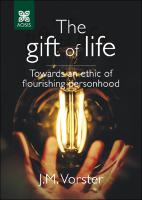The gift of life
Towards an ethic of flourishing personhood
| dc.contributor.author | Vorster, Jakobus | |
| dc.date.accessioned | 2022-05-12T09:13:58Z | |
| dc.date.available | 2022-05-12T09:13:58Z | |
| dc.date.issued | 2021 | |
| dc.identifier | OCN: 1285908975 | |
| dc.identifier.uri | https://library.oapen.org/handle/20.500.12657/54356 | |
| dc.description.abstract | The concept ‘human life’ and what it entails have become a prominent idea in current theological-ethical discourses, especially in the growing Christian reflection on bioethics, eco-ethics, and social justice. Contemporary Christian ethicists focus on concepts such as ‘flourishing life’, ‘happiness’ and ‘joy’, and the means in which these deep human desires can be realised and fulfilled in life today amidst perennial surges of racism, xenophobia, sexism, systemic violence and policies and structures which further poverty and other forms of social injustices. Christian soteriology, and subsequent moral agency, grapples with the question: How can humans flourish in societies today and how should Christian morality be defined and designed to be instrumental in the current pursuit of happiness, joy and hope? This publication aims to participate in this modern-day discourse by proposing relevant theological perspectives on the concept of life and, in particular, its relevance for Christians living in this age and in an environment that poses major challenges to public morality and the common good. In conjunction with the emerging theological interest in the concept of life, this project is a modest attempt to take part in the advancement of an ethic of life for today, under the rubric of an ethic of flourishing personhood. The point of departure is the biblical concept of the gift of life and what this gift entails for the understanding human life, personhood and moral agency today. The line of reasoning in this book delineates the broad concept ethic of life and the biblical concept gift of life, and draws the line towards an ethic of flourishing personhood. The central theoretical argument of the study is that reformed theology can give direction to the contemporary theological search for meaning and purpose of human life and offer answers to the questions on life facing humanity today, especially by pursuing the idea of flourishing personhood. | en_US |
| dc.language | English | en_US |
| dc.subject.other | Human life; personhood; flourishing life; Genesis 2:7; reign of God; sacred life; unique life | en_US |
| dc.title | The gift of life | en_US |
| dc.title.alternative | Towards an ethic of flourishing personhood | en_US |
| dc.type | book | |
| oapen.identifier.doi | 10.4102/aosis.2021.BK276 | en_US |
| oapen.relation.isPublishedBy | d7387d49-5f5c-4cd8-8640-ed0a752627b7 | en_US |
| oapen.relation.isFundedBy | 208c8d2f-51b9-4ce8-94fd-a03ac746f4e3 | en_US |
| oapen.relation.isbn | 9781776341528 | en_US |
| oapen.relation.isbn | 9781776341535 | en_US |
| oapen.pages | 274 | en_US |

